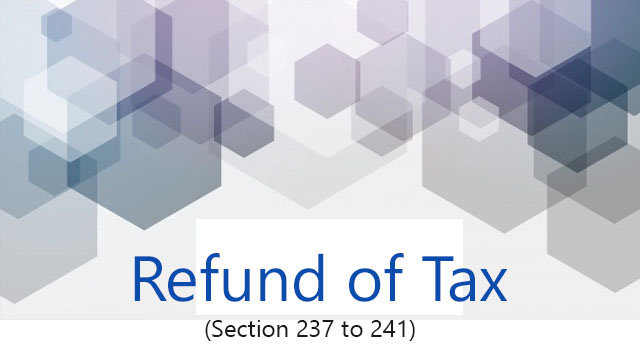Refund of Tax (Section 237 to 241) |
-
Who can Claim Refund of Tax
-
Who is entitled to Refund of Tax (Seciton 237)
-
Who can Claim Refund of Tax other than Assessee (Section 237)
-
Form and Period to Claim of Refund of Tax (Section 239 and Rule 41)
-
Refund of Tax on Appeal, etc. (Section 240)
-
Withholding of Refund of Tax in certain cases [Section 241A]
-
Set off of Refund of Tax against Tax / Demand Outstanding [Section 245]
|
|
1. Who can Claim Refund of Tax
Where an assessee has submitted any return of income and any refund of tax is due, such refund shall be granted by the Assessing Officer on his own. The assessee is not required to file any claim for such refund. Similarly, if any refund arises due to an order of appeal, rectification of mistakes, revision by CIT or appeal to the High Court, the refund shall be granted by the Assessing Officer himself. In this case also, the assessee is not required to file any claim for refund of tax.
Although an assessee who has submitted the return of income is not required to file Form No. 30 to claim refund but the return of income for the assessment year for which refund is due must be filed within the time limit provided under section 139.
Where assessee had claimed refund of lesser amount than that reflected in Form 26AS, he was to be permitted to make additional claim of refund. |
 |
2. Who is entitled to Refund of Tax (Seciton 237)
If any person satisfies the Assessing Officer that the amount of tax paid by him or on his behalf or treated as paid by him, or on his behalf for any assessment year exceeds the amount which he is properly chargeable under the Income-tax Act for that year, he shall be entitled to a refund of the excess tax paid. |
3. Who can Claim Refund of Tax other than Assessee (Section 237)
Although only the assessee is entitled to claim refund, however, in the following cases the refund can be claimed by a person other than the assessee:
-
where the income of one person is included under any provision of the Income-tax Act in the total income of any other person, the latter alone shall be entitled to a refund in respect of such income;
-
where the value of fringe benefits provided or deemed to have been provided by one employer is included under any provisions of Chapter XII-H in the value of fringe benefits provided or deemed to have been provided by any other employer, the later alone shall be entitled to a refund under this Chapter in respect of such fringe benefits;
-
where through death, incapacity, insolvency, liquidation or other cause, a person is unable to claim or receive any refund due to him, his legal representative or the trustee or guardian or receiver, as the case may be, shall be entitled to claim or receive such refund for the benefit of such person or his estate.
|
|
4. Form and Period to Claim of Refund of Tax (Section 239 and Rule 41)
Every claim for refund should be made in the prescribed form i.e. Form No. 30 and it should be verified in the prescribed manner. The claim of refund should be made within one year of the last day of the relevant assessment year.
Where any part of the total income of a person making a claim for refund of tax, consists of any income from which tax has been deducted under the provisions of sections 192 to 194, 194A and 195, the claim shall be accompanied by the TDS certificates prescribed under section 203.
The delay in filing the claim may be condoned by the Assessing Officer and the claim may be disposed off according to merits, under certain circumstances.
The claim for refund may be presented by the claimant in person or through a duly authorised agent or may be sent by post. |
5. Refund of Tax on Appeal, etc. (Section 240)
Where, as a result of any order passed in appeal or other proceeding under this Act, refund of any amount becomes due to the assessee, the Assessing Officer shall, refund the amount to the assessee without his having to make any claim in that behalf.
Provided that where, by the order aforesaid—
-
an assessment is set aside or cancelled and an order of fresh assessment is directed to be made, the refund, if any, shall become due only on the making of such fresh assessment.
-
the assessment is annulled, the refund shall become due only of the amount, if any, of the tax paid in excess of the tax chargeable on the total income returned by the assessee.
|
6. Withholding of Refund of Tax in certain cases [Section 241A]
For every assessment year commencing on or after the 1st day of April, 2017, where refund of any amount becomes due to the assessee under the provisions of sub-section (1) of section 143 and the Assessing Officer is of the opinion, having regard to the fact that a notice has been issued under subsection (2) of section 143 in respect of such return, that the grant of the refund is likely to adversely affect the revenue, he may, for reasons to be recorded in writing and with the previous approval of the Principal Commissioner or Commissioner, as the case may be, withhold the refund up to the date on which the assessment is made.
In other words, for the returns furnished for assessment year commencing on or after 1.4.2017, where refund of any amount becomes due to the assessee under section 143(1) and the Assessing Officer is of the opinion that grant of refund may adversely affect the recovery of revenue, he may, for the reasons recorded in writing and with the previous approval of the Principal Commissioner or Commissioner, withhold the refund upto the date on which the assessment is made. |
7. Set off of Refund of Tax against Tax / Demand Outstanding [Section 245]
Where under any of the provisions of the Income-tax Act, a refund is found to be due to any person, the Assessing Officer, Commissioner (Appeals) or Principal Chief Commissioner or Chief Commissioner or Principal Commissioner or Commissioner, as the case may be, may, in lieu of payment of the refund, set off the amount to be refunded or any part of that amount, against the sum, if any, remaining payable under the Income-tax Act by the person to whom the refund is due, after giving an intimation in writing to such person of the action proposed to be taken. |
| |
|
 |
Related Topics...on 'Advance Tax' and 'Refund' |
|
|
|
|
|





